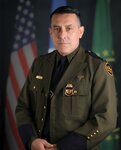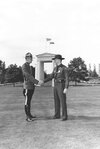

The U.S. Border Patrol is celebrating its centennial May 28. Leading up to the anniversary, The Northern Light sat down with Rosario Pete Vasquez, chief patrol agent for the Blaine sector of U.S. Border Patrol.
Vasquez, who has held the position since last June, oversees the largest geographical sector in the U.S. which includes western Washington, Oregon, northern California and Alaska. The sector covers about 37,000 miles of coastline and 1,600 miles of land border.
Vasquez has had over a dozen positions within the federal agency, including as a canine handler in Yuma, Arizona, working at headquarters in Washington, D.C., assistant attaché for U.S. Customs and Border Protection in Canada, and various leadership positions in San Diego, including patrol agent in charge of the Campo station, his last position before Blaine.
Vasquez discussed the 100th anniversary of border patrol, how the agency has evolved over the years and the biggest challenges the Blaine sector faces today.
The interview was edited for brevity and clarity.
A: Initially, I was getting my degree in fire science because I wanted to be a firefighter paramedic. I went to Southwestern College and Miramar College in San Diego. And then I found out that Border Patrol was starting a unit called the Border Patrol, Search, Trauma and Rescue team (BORSTAR) and that interested me with the law enforcement piece, but also being a medic and doing search and rescue.
I had an application with San Diego city fire and Border Patrol. I told myself, ‘I’m going to go wherever selects me first’ and Border Patrol called first.
A: The Border Patrol has a very long and rich history over our 100-year period, from prohibition days, to helping civil rights and helping during national security events. After 9/11 and the creation of CBP, our mission has expanded to prevent terrorists and terrorist weapons from entering the country.
We are also called upon to assist with natural disasters or national emergency events. That was especially important during Hurricane Katrina, when there was sniper shootings and looting. We provided security for the rescue resources deployed.
A: It first started May 28, 1924 and it was a very small agency. It was really the U.S. Immigration Service, our founding agency.
I’ve seen growth since I joined in 2000. We were under 10,000 agents. Now, we’re approaching 20,000 and Congress recently approved us to grow to 22,000.
The immigration piece has changed over the years. The demographics have changed.
With the creation of CBP and Department of Homeland Security, we’re still growing and maturing into our new roles. We foster our partnership with our federal partners and make sure we’re coordinating with them.
A: The northern border is very expansive. We’re always in competition for resources with the southern border. We work to maximize our partnerships. There’s a lot of work to be done on border security overall for the entire country. We need more personnel and resources to do our job.
A: I hope to see additional staffing, additional resources. I’d like to see us have a more robust maritime presence in this area.
And I’d really like to see additional affordable housing for our personnel. The one thing that’s always important on my list is taking care of the Blaine personnel and making sure they have what they need to get the job done, but also to have a good family life and time away from work.
A: A lot of people equate us to just being immigration police, but that’s not our primary focus and our mission is much broader. Our focus is national security and border security. Anything crossing the border is of interest to us, whether that’s people or contraband. And we’re going to do what we need to mitigate that.
We have to think about terrorists crossing the border, weapons, narcotics or other illegal contraband. We’re an all threats agency for anything that’s crossing the border that’s not supposed to be. It gets politicized and our personnel get villainized.
A: We try to have a good mixture of technology, personnel and partnerships.
Some of the difficulties we face is the diversity of terrain, very mountainous to the east and maritime to the west. We can run into different types of difficulties with getting technology signals but that’s where it comes into working with our partners or headquarter staff to come up with solutions.
A: My personnel are always my most important thing. The agents are part of the community. They have kids that attend schools, significant others who work in the community and they want to be a part of their community.
We care about the communities we work in. We’re out there doing what we can every day to make sure they’re safe and protected, and that this country and the nation is protected.
Comments
No comments on this item Please log in to comment by clicking here